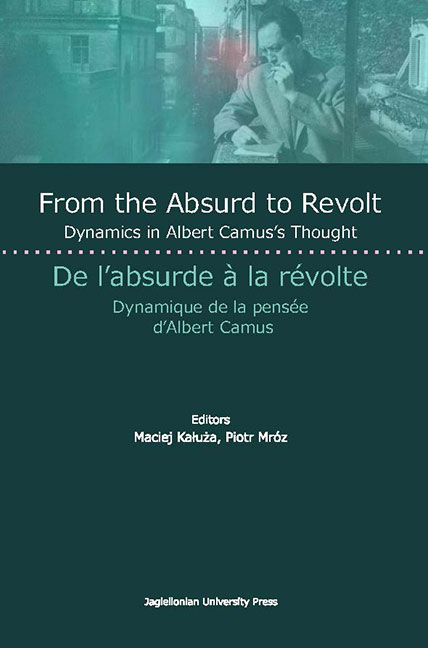Book contents
- Frontmatter
- Contents
- Introduction
- Part One From the Absurd to Revolt, Analysis of Sources for Camusian Concept of Revolt
- Part Two Camus's Revolt in Contemporary Analysis
- Part Three Camus's Revolt in Comparatistic Studies
- “I Hope This Ireland We're Fighting for is Worth It”: Camus’ L'Homme Révolté through Ken Loach's The Wind That Shakes the Barley
- Vers le dialogue: Albert Camus et Leszek Kolakowski
- Le rire de Sisyphe et la danse de Zarathoustra
- Is a Rebel an Outsider? Rebellion in the Interpretation of Colin Wilson
- Il faut sauver les jeunes filles qui se précipitent d'un pont: pour un renouvellement de la lecture de L'Envol de J. Iwaszkiewicz (1957)
Camus and Dostoyevsky's Philosophical Challenge – a Strange Spiritual Affinity
from Part Three - Camus's Revolt in Comparatistic Studies
Published online by Cambridge University Press: 22 December 2017
- Frontmatter
- Contents
- Introduction
- Part One From the Absurd to Revolt, Analysis of Sources for Camusian Concept of Revolt
- Part Two Camus's Revolt in Contemporary Analysis
- Part Three Camus's Revolt in Comparatistic Studies
- “I Hope This Ireland We're Fighting for is Worth It”: Camus’ L'Homme Révolté through Ken Loach's The Wind That Shakes the Barley
- Vers le dialogue: Albert Camus et Leszek Kolakowski
- Le rire de Sisyphe et la danse de Zarathoustra
- Is a Rebel an Outsider? Rebellion in the Interpretation of Colin Wilson
- Il faut sauver les jeunes filles qui se précipitent d'un pont: pour un renouvellement de la lecture de L'Envol de J. Iwaszkiewicz (1957)
Summary
The world of ideas is like a poker game or, to resort to existentialist terminology, appears to be deeply imbued with the illusive yet tangible atmosphere of contingence. Both Camus and Sartre were interested in world literature, both were avid readers of novels depicting the conditio humana, and did not limit themselves in their reading activities to French, contemporary and classic literary output but included in their perusals works scarcely known as well as those popular at the time (the thirties and early forties of the last century) among a wider public – such literary figures as Tolstoy and Dostoyevsky, Shestov or Merezhkovsky – Russian masters of the 19th and 20th century. But first and foremost it was Camus who seems to have followed and symphatized with the unique spirit of the Russian soul with its sense of ensuing absurdity and overwhelming blind chance. The following is a juxtaposition of Camus's understanding of the Russian giant of literature and ideas which were paradoxically close to his understanding and feeling – the views of a Polish Catholic existentialist (Camus's contemporary) Father Woroniecki. Such a “venue” of world views and opinions – irrespective of their ideological and religious foundations – is only possible in the meta-reality of the world of universal (catholon) culture. We shall make some references to the works of Merezhkovsky, Shestov and Evdokimov as close intellectual and spiritual allies of Camus.
On the basis of his numerous treaties, we can view Dostoyevsky as an expert on difficult and complicated philosophical-theological problems on the one hand, and on the other – the voice of a priest-tutor, a teacher-patriot constantly caring for and providing appropriate development to the vast masses of the faithful exposed to nefarious influences over many centuries, the faithful succumbing to degenerate fashion or harmful habits (e.g. sentimentalism, miscomprehended romanticism, relativist attitudes, eudemonistical or materialist stands) which take one far from the authentic dimension of faith. (All these are sings of inauthentic existence in existentialism.)
Many fragments of Katolicka Etyka (Catholic Ethics)1 allude directly to the “beyond academic” threads, life situations or even personal recollections, various literary traditions: Romanticism, the Medieval Literature and the modern prose and drama, and are proof of the tremendous sensitivity of the author of Katolicka Etyka.
- Type
- Chapter
- Information
- From the Absurd to Revolt/De l'absurde a la Revolte , pp. 267 - 277Publisher: Jagiellonian University PressPrint publication year: 2017

